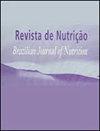Determinants of disordered eating behaviors: Body mass index, emotional eating, dietary restriction, and motives for eating palatable foods
IF 0.5
4区 医学
Q4 NUTRITION & DIETETICS
Revista De Nutricao-brazilian Journal of Nutrition
Pub Date : 2023-01-01
DOI:10.1590/1678-9865202336e220086
引用次数: 0
Abstract
ABSTRACT Objective: The study aimed to investigate the relationships between body mass index, reasons for consuming palatable foods, emotional eating, cognitive dietary restraint, and disordered eating behaviors in young adults. Methods: This study was conducted with 800 young adults, in Ankara, Türkiye. A questionnaire consisting of questions about socio-demographic characteristics, health status, and instruments including Eating Attitudes Test-26, Emotional Appetite Questionnaire, Palatable Eating Motives Scale, and The Three-Factor Eating Questionnaire were applied through face-to-face interviews. Results: According to the Eating Attitudes Test-26, 17.2% of males and 27.7% of females were at risk for disordered eating behaviors (χ2=9.750, p=0.002). The mean scores of the Three-Factor Eating Questionnaire-emotional eating, cognitive restraint subscales, and the positive and negative scores of the Emotional Appetite Questionnaire were higher in males than in females (p<0.05). The mean scores of the Palatable Eating Motives Scale-coping and reward enhancement motives were higher in females, while the mean score for the conformity motives was significantly higher in males. Body mass index, Three-Factor Eating Questionnaire-cognitive restraint subscale, Emotional Appetite Questionnaire-negative, and PEMS-conformity motives were found for predictors for Eating Attitudes Test-26 (all p<0.05). Conclusion: The results showed a high tendency for emotional eating, consumption of palatable foods, and cognitive dietary restraint in young adults, and these factors were considered determinants for eating disorders.饮食紊乱行为的决定因素:体重指数、情绪化饮食、饮食限制和吃美味食物的动机
摘要目的:本研究旨在探讨青少年体重指数、食用美味食物的原因、情绪性进食、认知性饮食限制与饮食失调行为的关系。方法:本研究在土耳其安卡拉的800名年轻人中进行。采用面对面访谈法对社会人口学特征、健康状况进行问卷调查,并采用《饮食态度测试-26》、《情绪食欲问卷》、《美味饮食动机量表》和《三因素饮食问卷》等工具。结果:饮食态度调查显示,17.2%的男性和27.7%的女性存在饮食失调的风险(χ2=9.750, p=0.002)。三因素进食问卷情绪性进食、认知克制分量表的平均得分、情绪性食欲问卷的正、负得分男性均高于女性(p < 0.05)。适口饮食动机量表——应对动机和奖励增强动机的平均得分在女性中较高,而顺从动机的平均得分在男性中显著较高。体重指数、三因素进食问卷-认知约束子量表、情绪食欲问卷-负性和pems -顺从动机是进食态度测试-26的预测因子(均p < 0.05)。结论:结果显示,年轻人情绪化进食、食用美味食物和认知性饮食限制的倾向较高,这些因素被认为是饮食失调的决定因素。
本文章由计算机程序翻译,如有差异,请以英文原文为准。
求助全文
约1分钟内获得全文
求助全文
来源期刊
CiteScore
1.20
自引率
12.50%
发文量
24
审稿时长
6-12 weeks
期刊介绍:
Revista de Nutrição is former Revista de Nutrição da Puccamp, founded in 1988. It is a bimonthly publication every four months and it is of responsibility of the Centro de Ciências da Vida, da Pontifícia Universidade Católica de Campinas . It publishes articles that contribute to the study of Nutrition in its many sub-areas and interfaces; and is open to contributions of the national and international scientific communities.

 求助内容:
求助内容: 应助结果提醒方式:
应助结果提醒方式:


